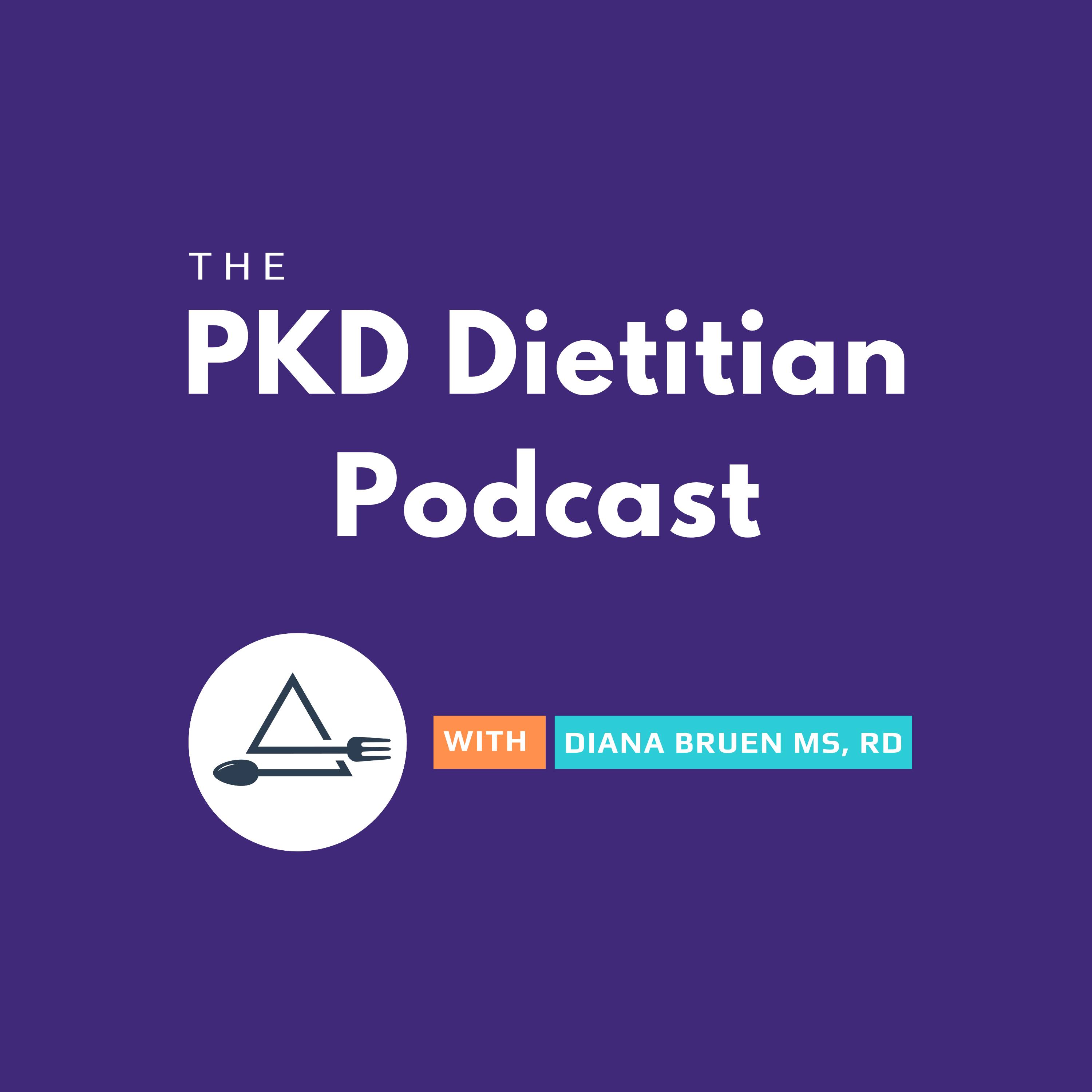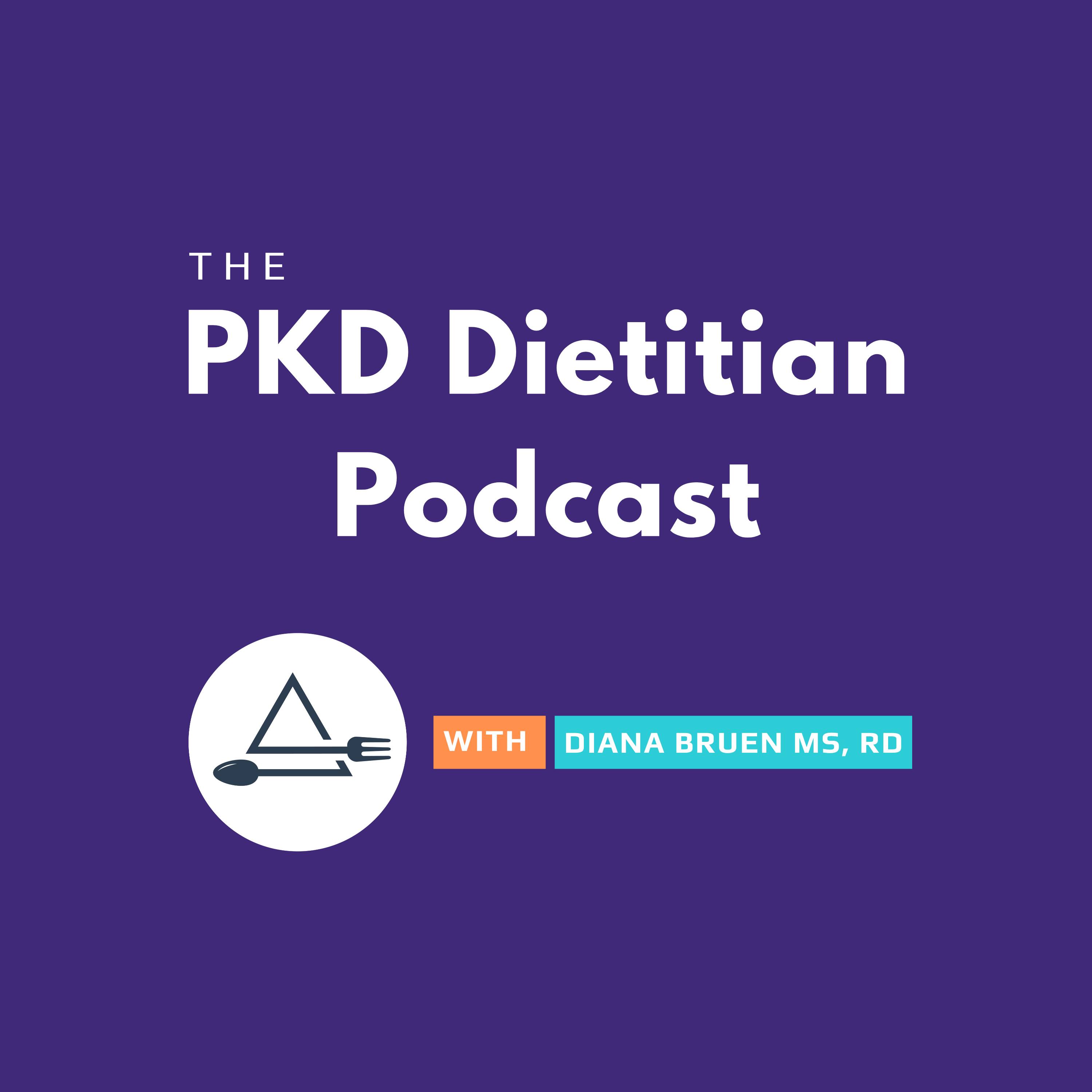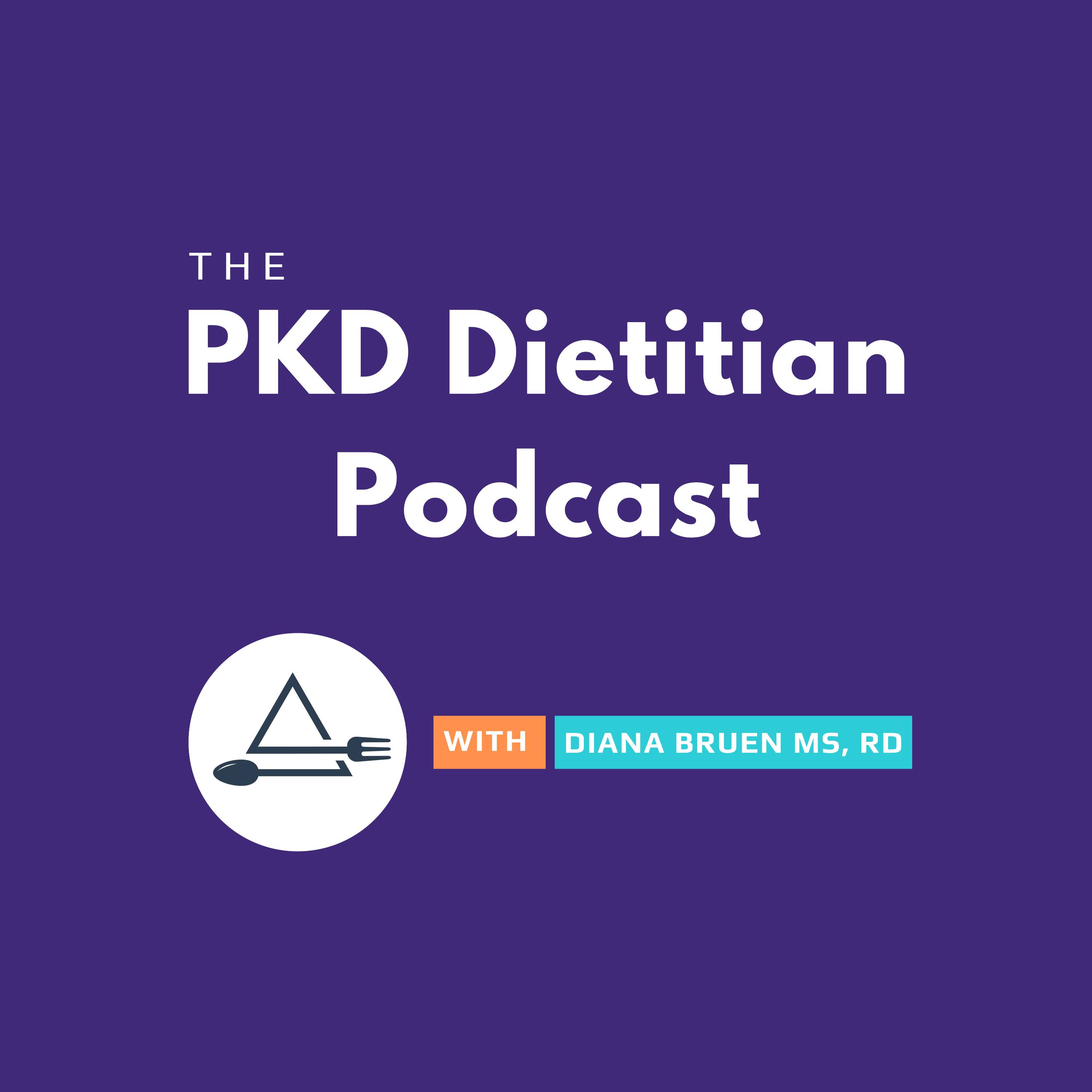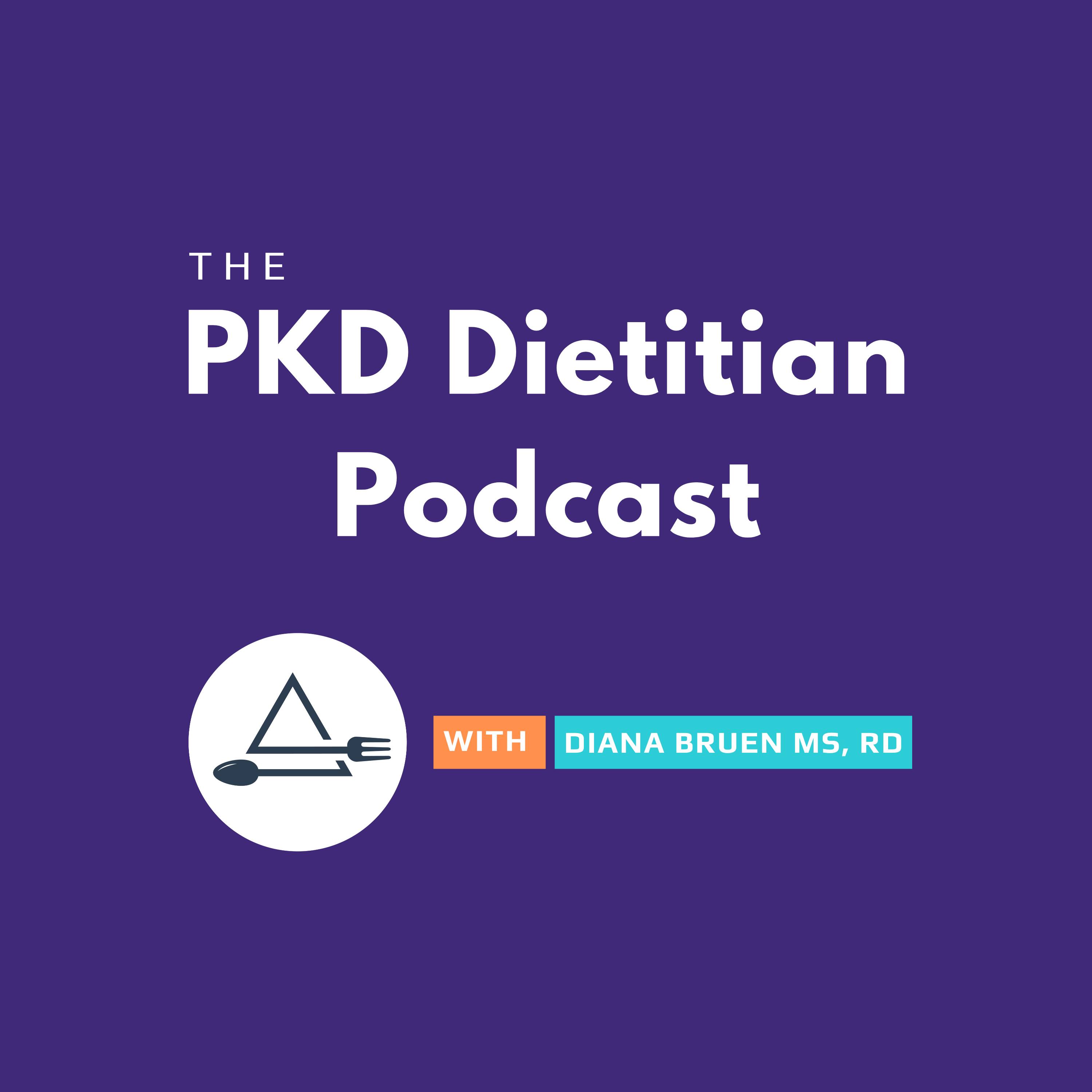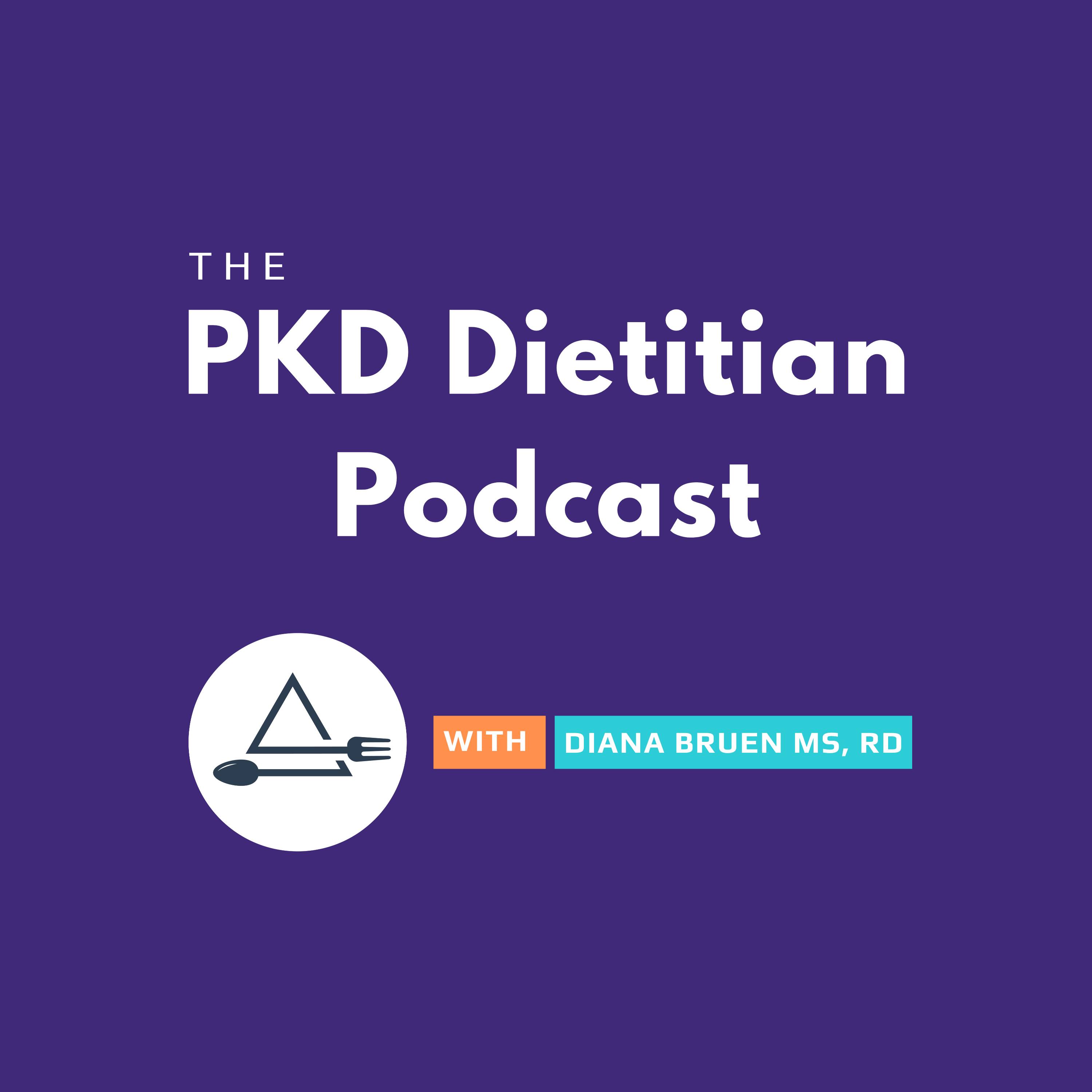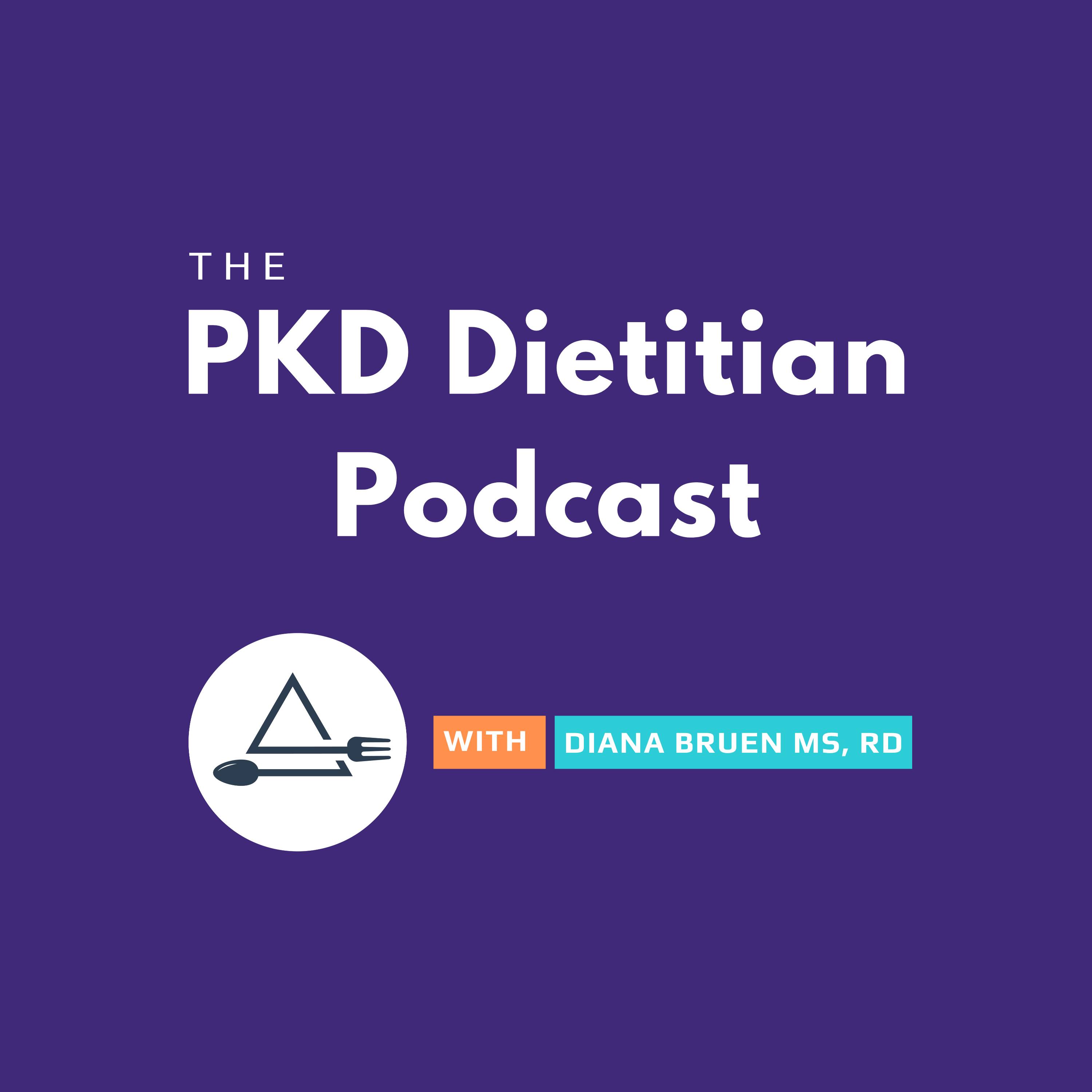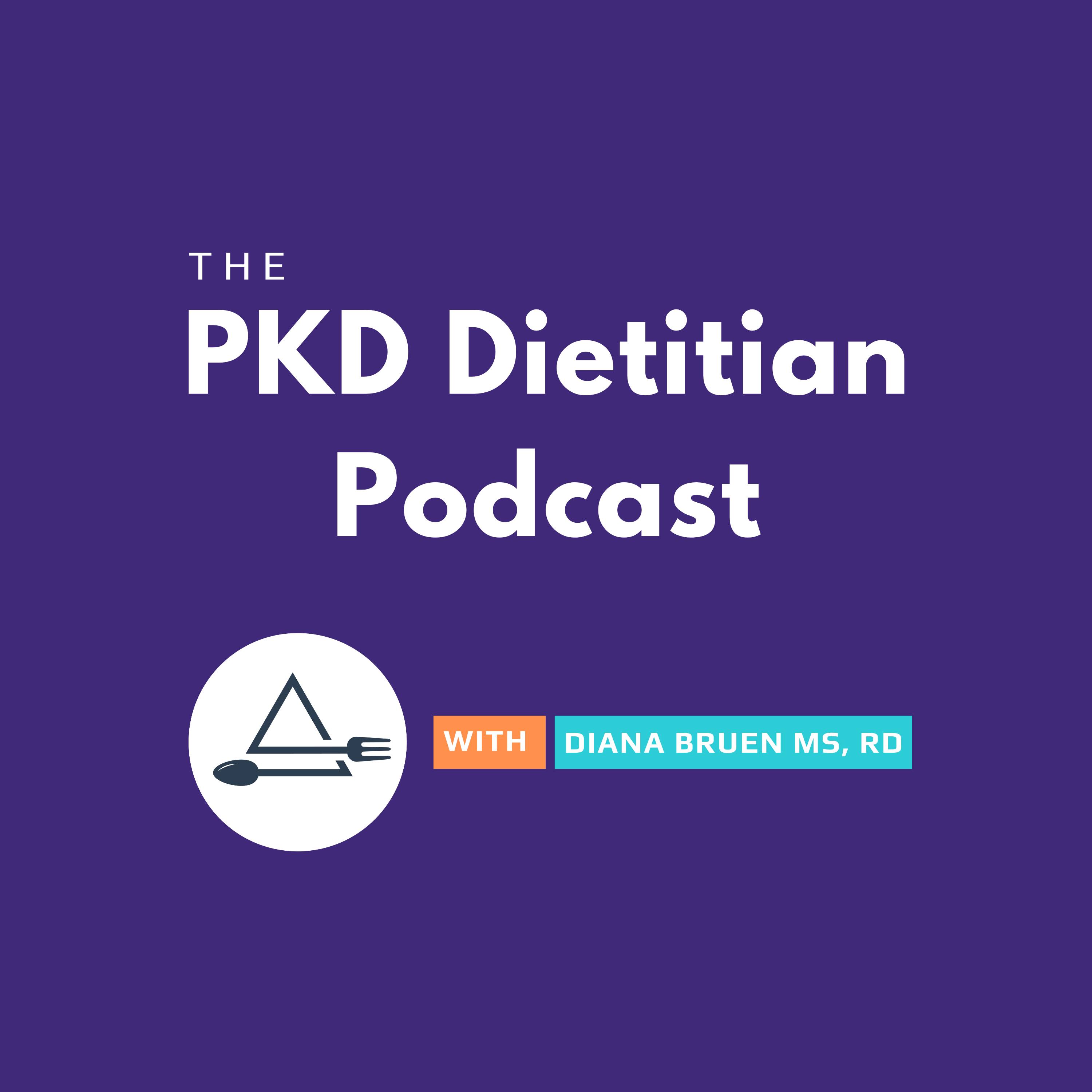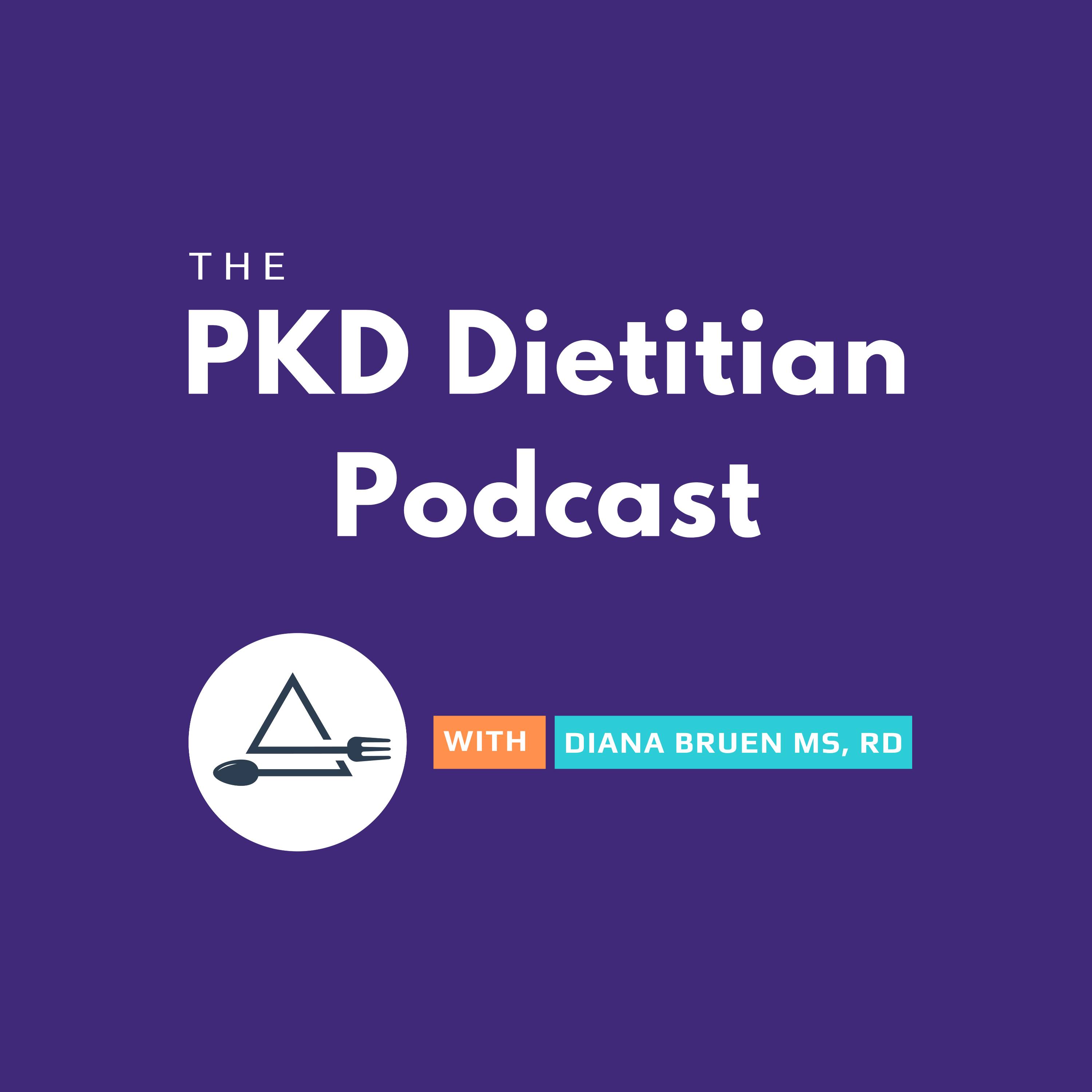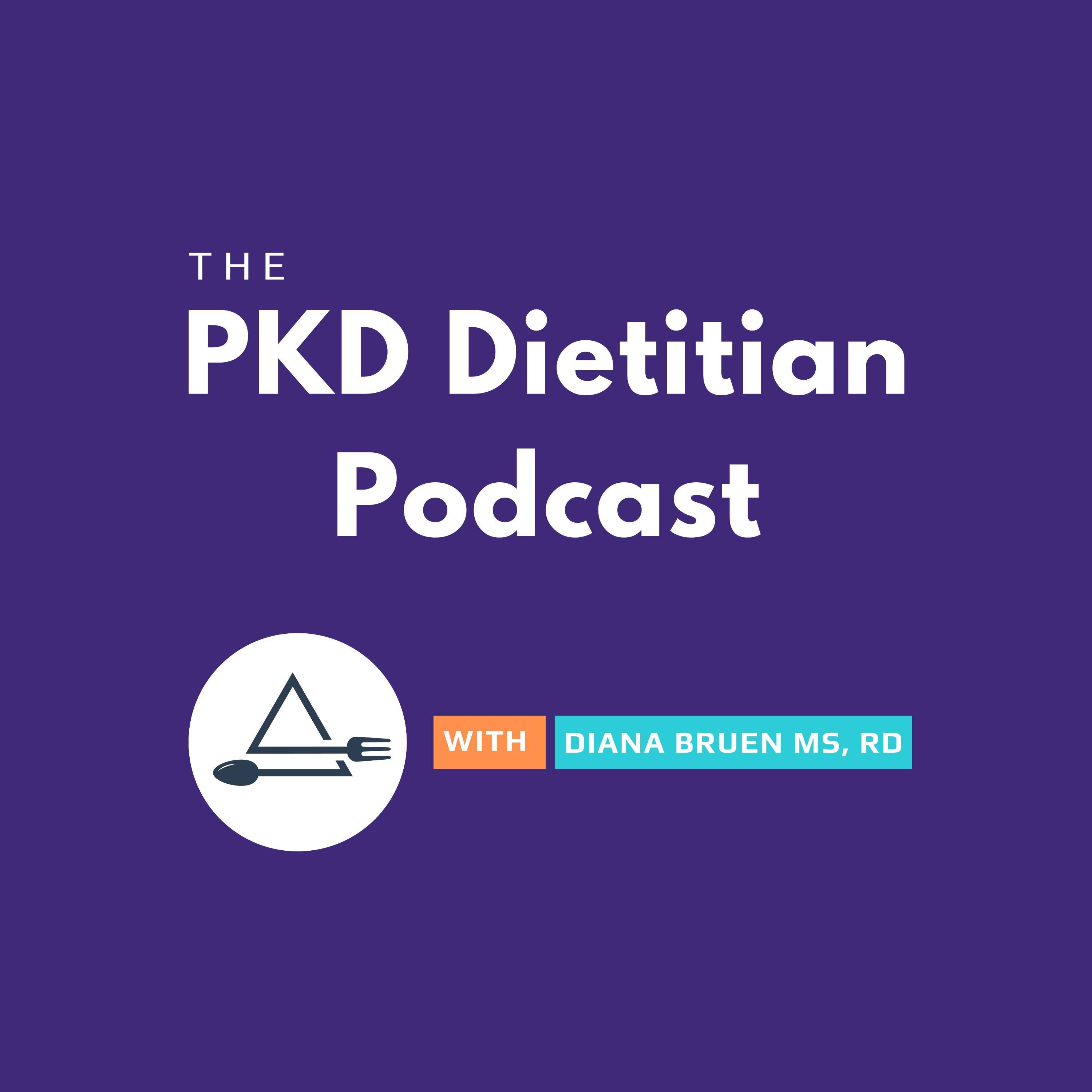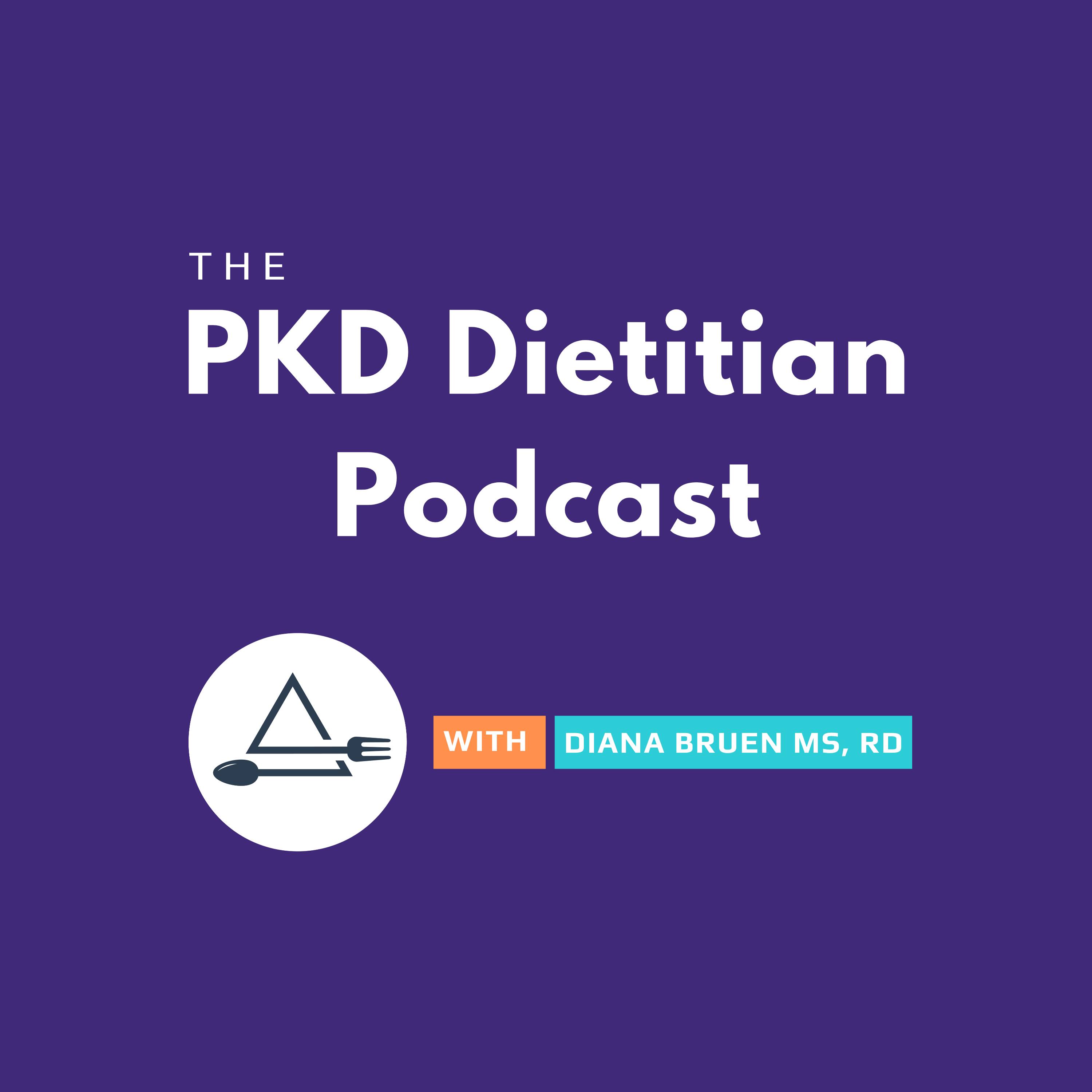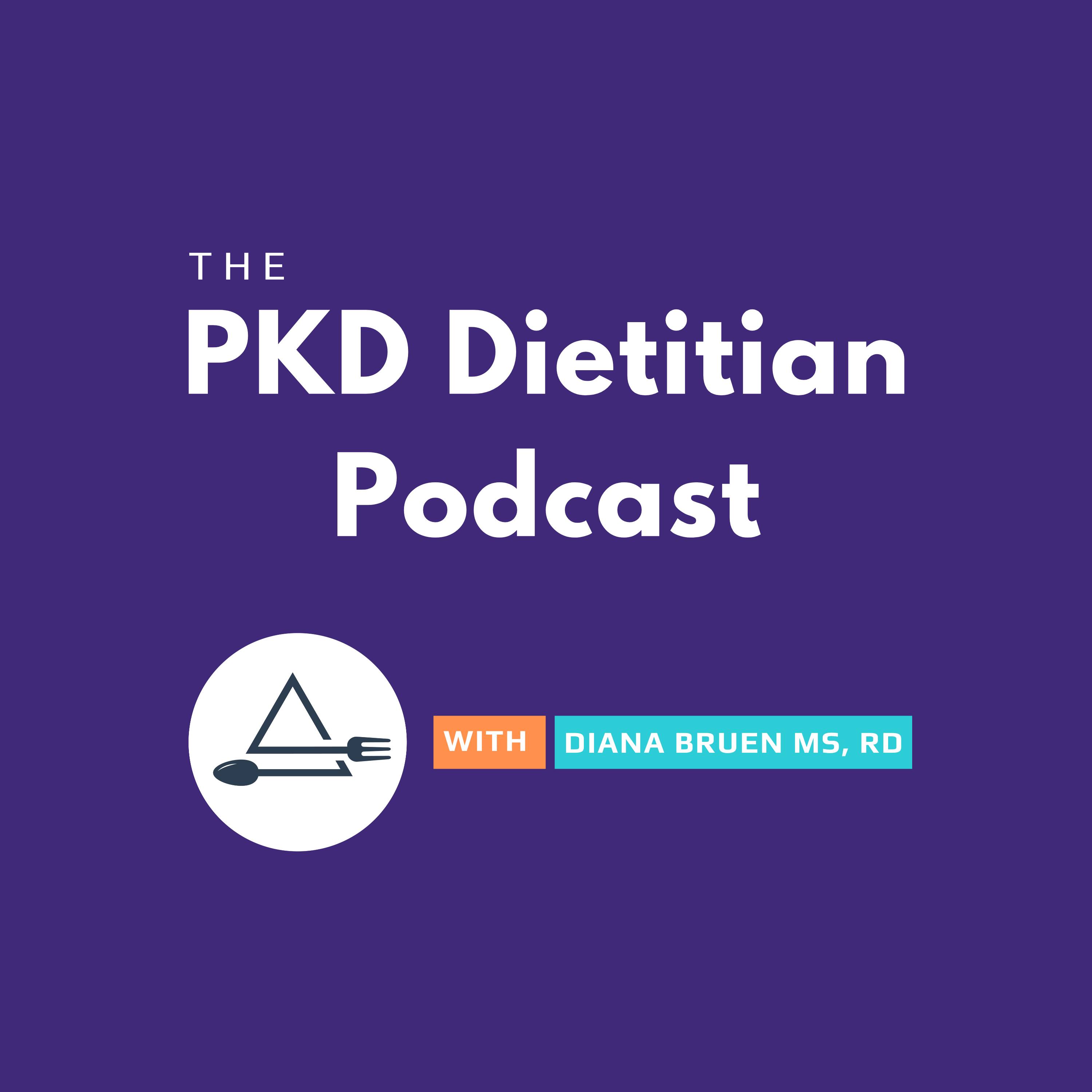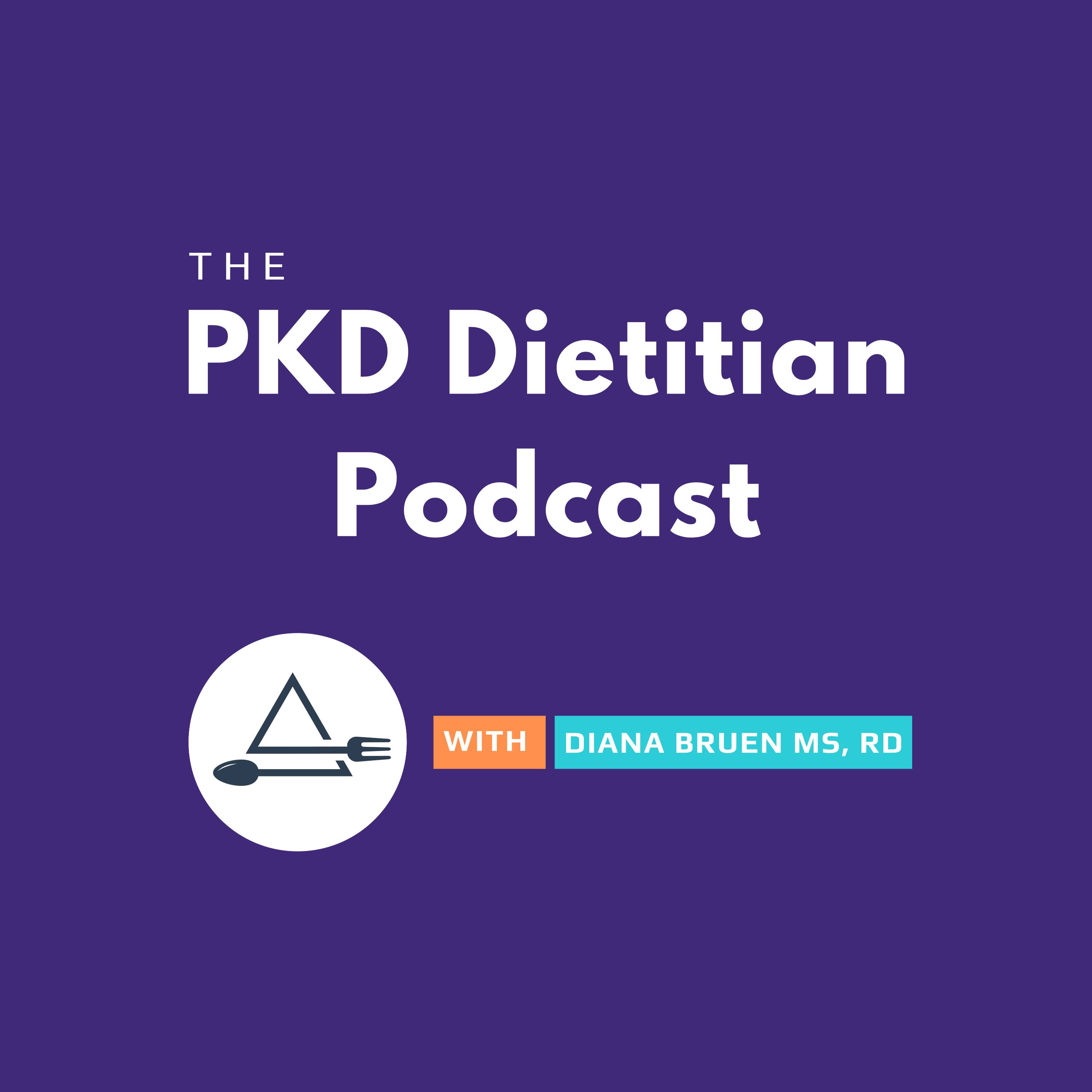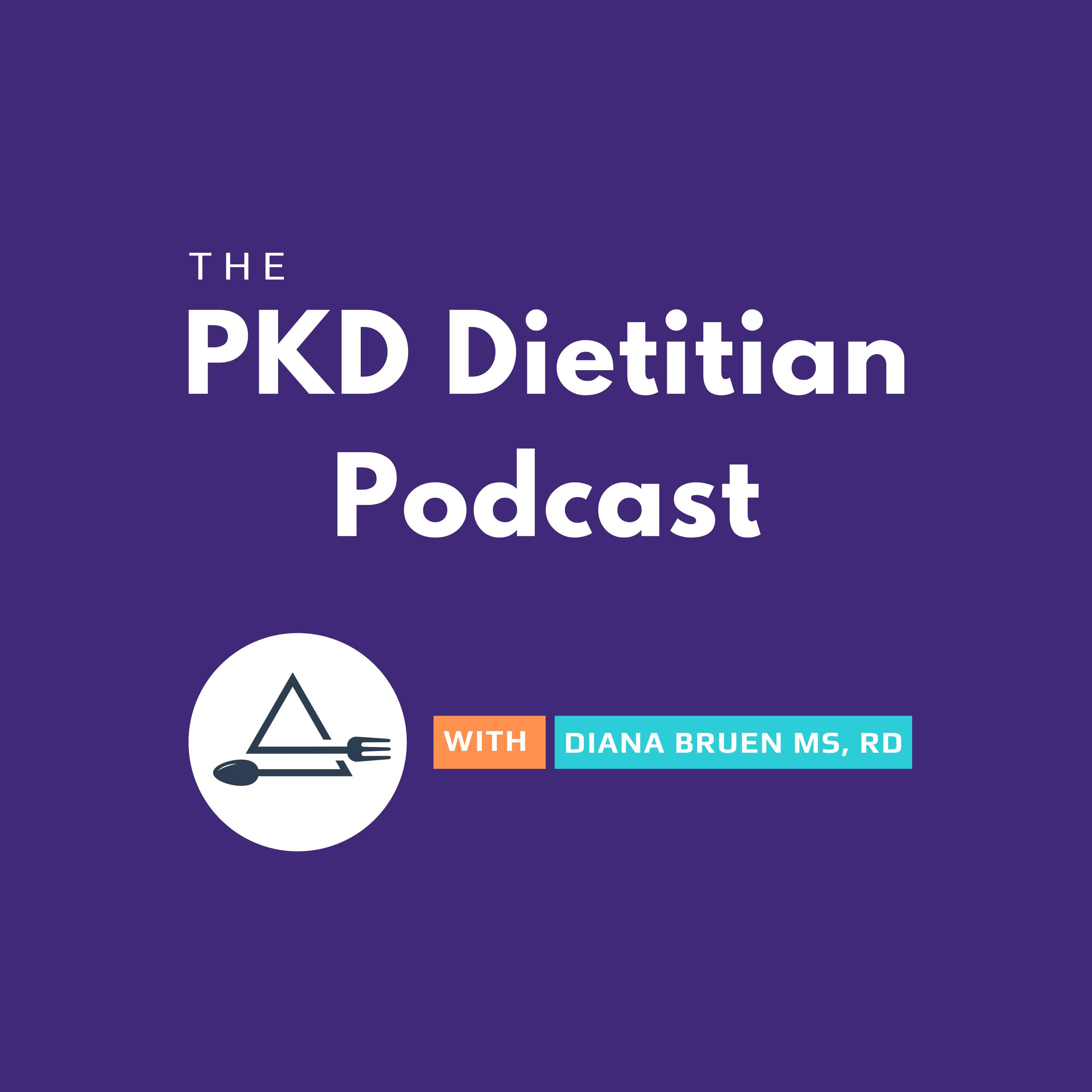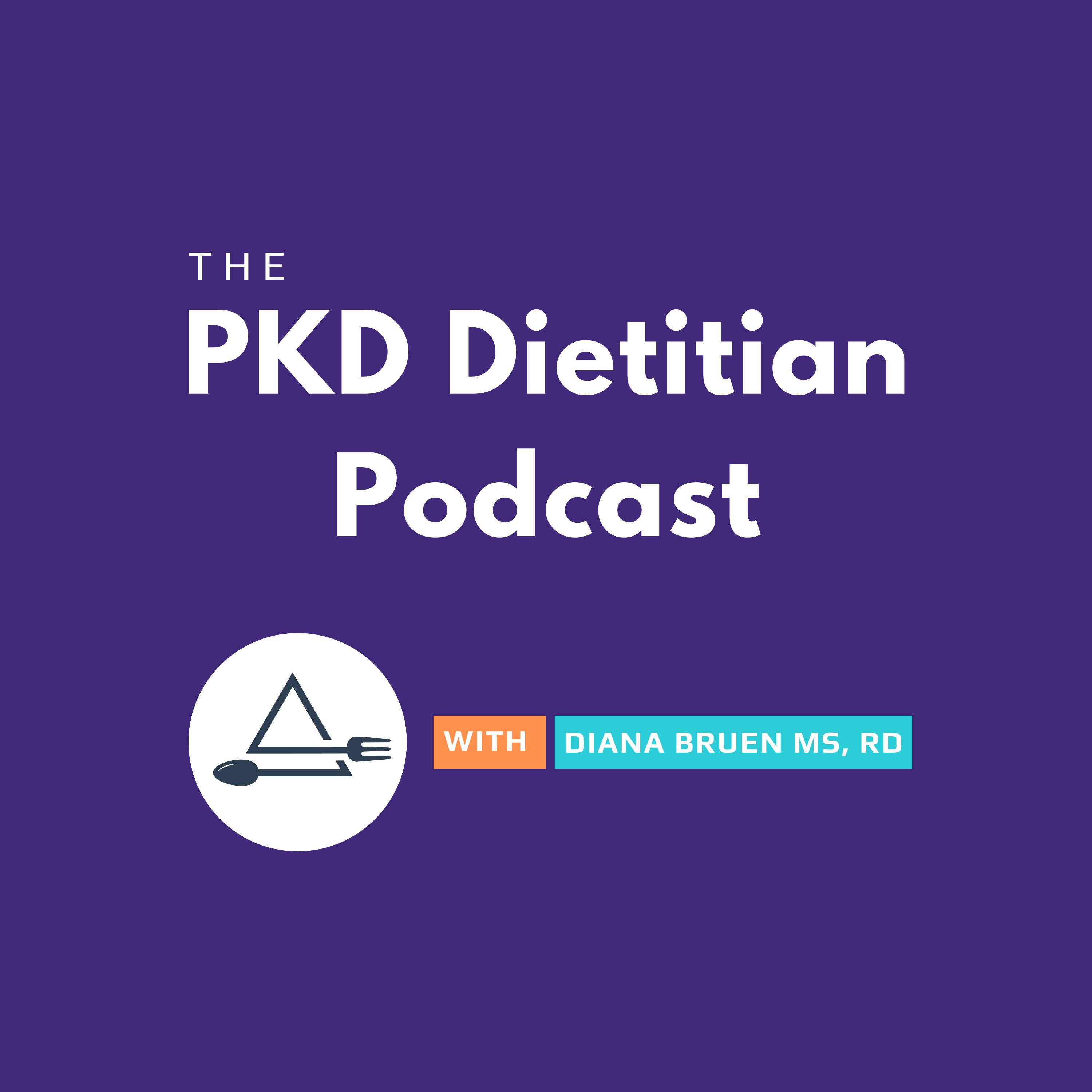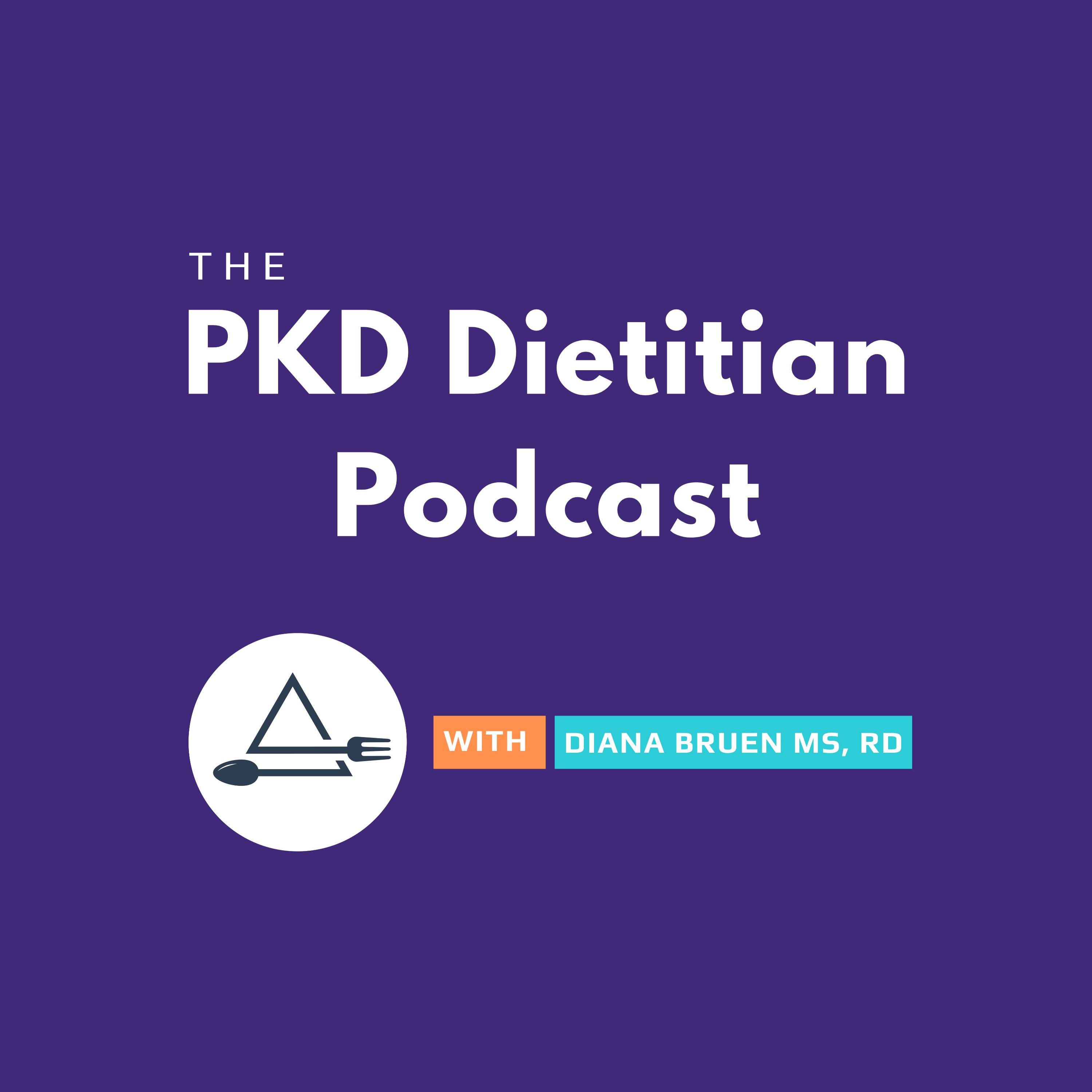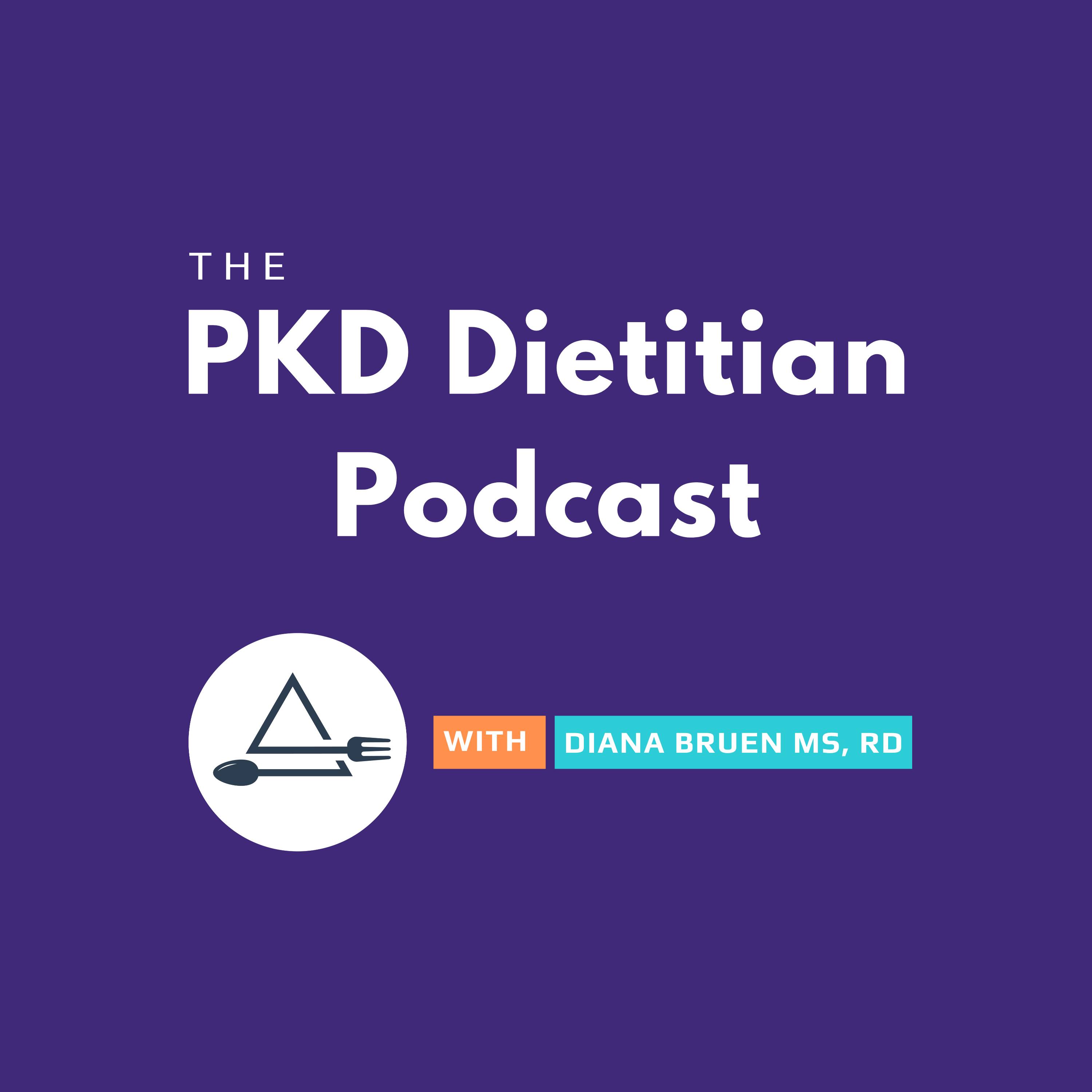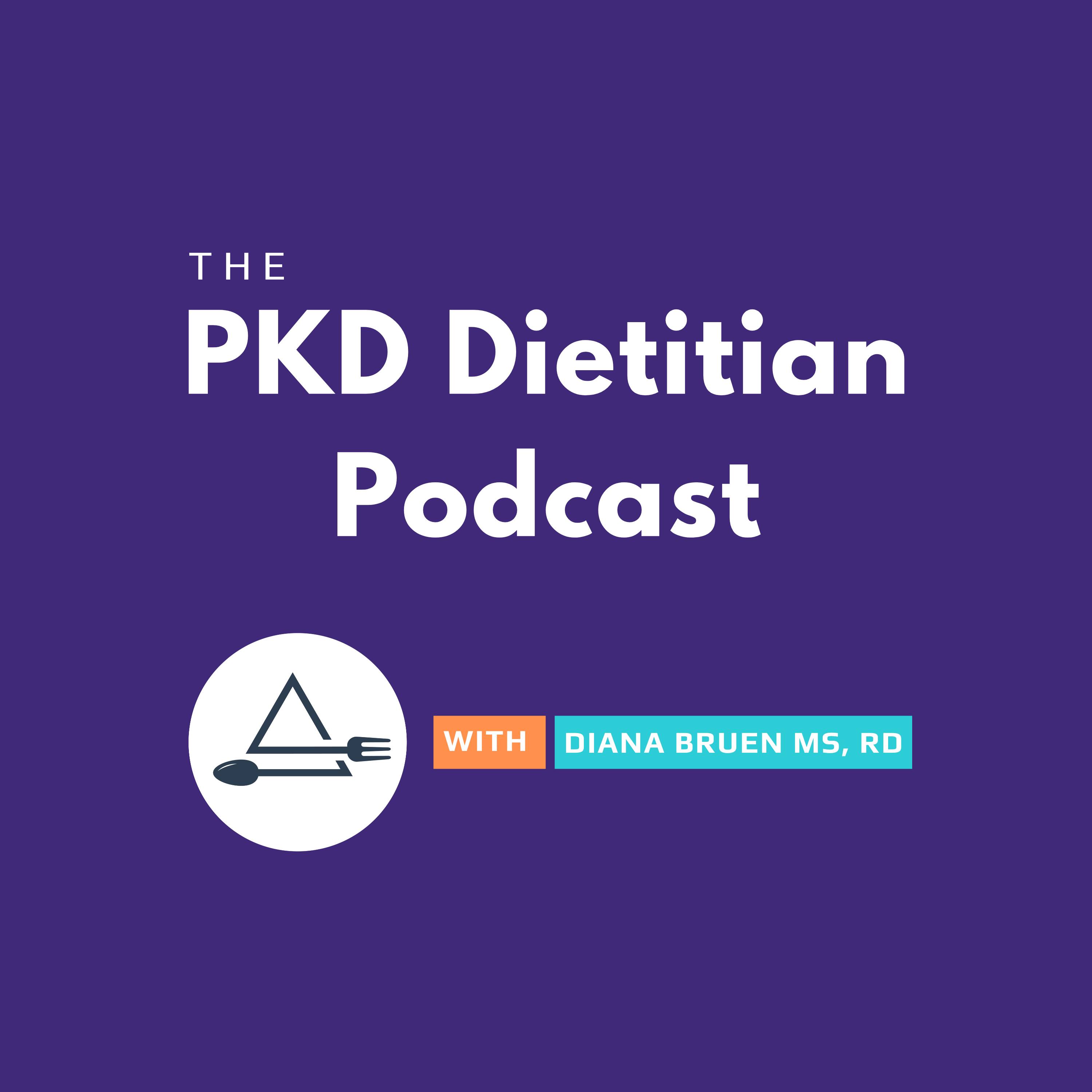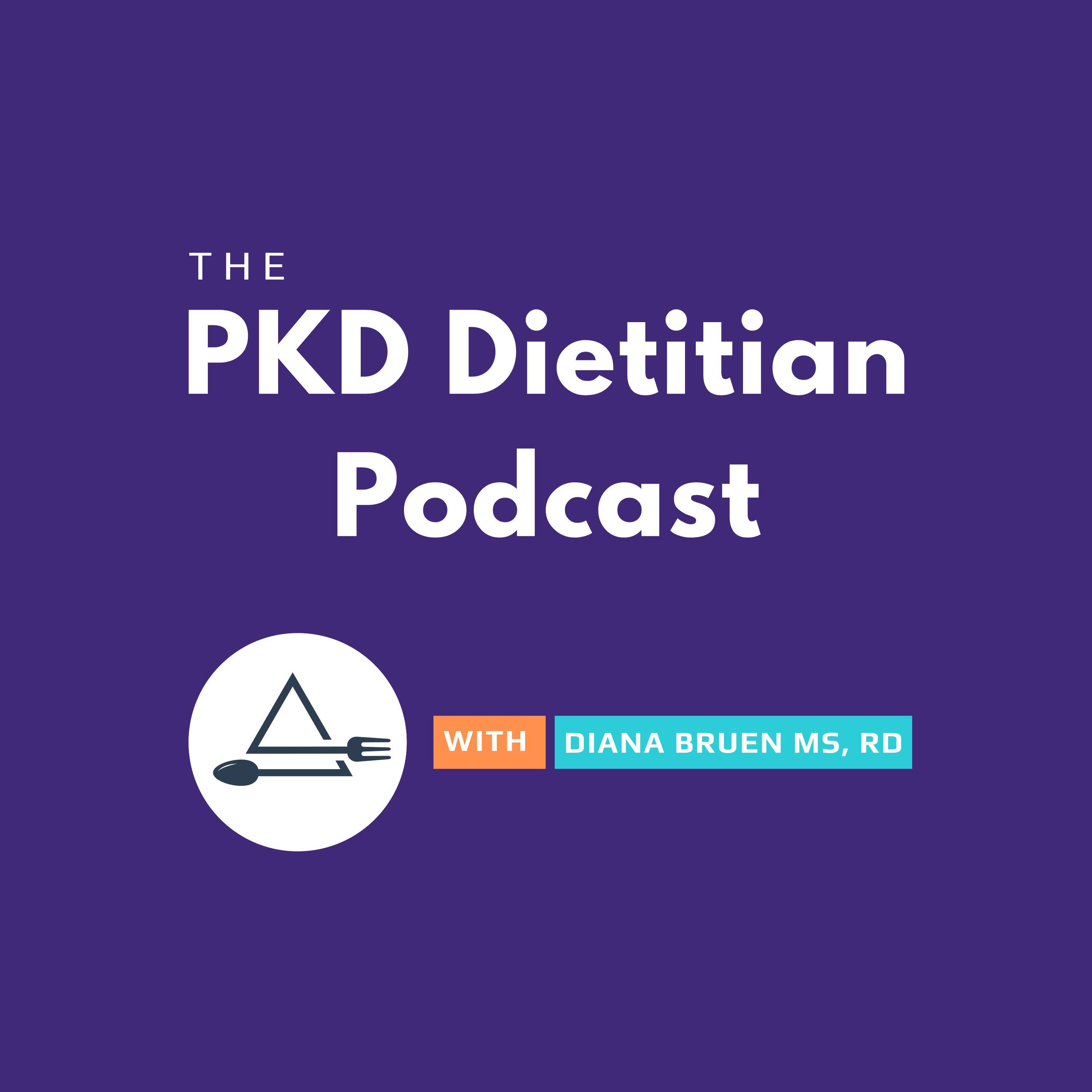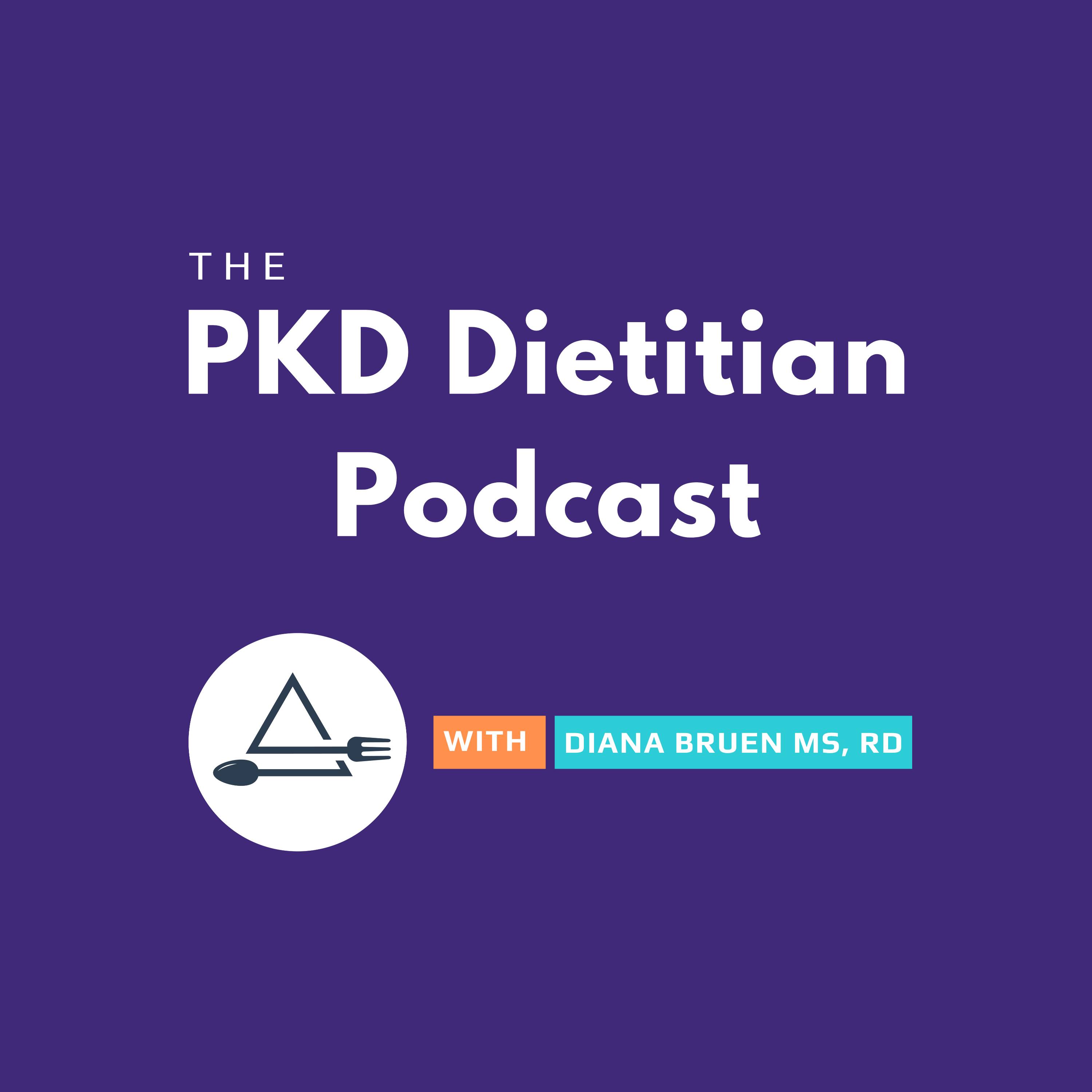Discover The PKD Dietitian Podcast
The PKD Dietitian Podcast

52 Episodes
Reverse
In this episode of The PKD Dietitian Podcast, we dive into carbs and PKD. Do carbohydrates make cysts grow faster? Are all carbs “bad” for kidney health? Diana breaks down the different types of carbs — and explains how they can impact your blood sugar, weight, and PKD progression. You’ll learn practical strategies to check in with your carb intake, what to focus on and how to make make sustainable changes to support PKD kidney health.
RESOURCES & LINKS
Show notes, references, and transcript: https://www.thepkddietitian.com/carbsandpkd
Keto Mastery Program: https://www.thepkddietitian.com/ketomasteryprogram
DISCLAIMER: The PKD Dietitian Podcast is for educational purposes only. It is not a substitute for professional medical advice, diagnosis, or treatment.
Welcome back to the PKD Dietitian Podcast, it's time to get a little personal. Today's episode is a quick update on why episodes stopped, what's been going on behind the scenes both personally and professional at The PKD Dietitian, plus what's next for the podcast!
RESOURCES
Keto Mastery Program for PKD Health https://www.thepkddietitian.com/ketomasteryprogram
Mayo Clinic PKD Resource Center https://mcpress.mayoclinic.org/polycystic-kidney-disease/
Navigating Nutrition Therapy for ADPKD https://www.jrnjournal.org/article/S1051-2276(25)00025-1/fulltext
CONNECT
Instagram: https://www.instagram.com/the.pkd.dietitian/
Facebook: https://www.facebook.com/PKDdietitian
Website: https://www.thepkddietitian.com/
DISCLAIMER
The PKD Dietitian Podcast is meant for educational purposes only. It is not a substitute for professional medical advice, diagnosis, or treatment.
Listener Q: "What is the difference between eGFR and GFR? Is one better than the other for getting tested for PKD, or should I ask for both? I am worried I am not getting the labs I need to stay informed about my kidneys."
Answer: Tune in and find out:
What GFR is
What eGFR is
If there are the same
What you need to know about each and if you need to get both tested for Polycystic Kidneys
MASTER YOUR LABS FOR PKD
Yes, Sign Me Up!
Learn More - https://www.thepkddietitian.com/masteryourlabs
RESOURCES
Episode #33 What is Cystatin C and Should You Get it Tested? https://www.thepkddietitian.com/podcasts/the-pkd-dietitian-podcast/episodes/2148345282
NKF’s eGFR Calculator https://www.kidney.org/professionals/gfr_calculator
LET’S CONNECT
INSTAGRAM: https://www.instagram.com/the.pkd.dietitian/
FACEBOOK: https://www.facebook.com/PKDdietitian
EMAIL ME: https://www.thepkddietitian.com/site/contact
DISCLAIMER: The PKD Dietitian Podcast is meant for educational purposes only. It is not a substitute for professional medical advice, diagnosis, or treatment.
In this episode of The PKD Dietitian Podcast, Diana Bruen answers a listener's question about the safety of eating nightshades like eggplant and red peppers for those with polycystic kidney disease (PKD). She breaks down what nightshades are, why some people avoid them, and what the research really says. Forget the conflicting advice online—Diana shares the evidence-based truth about how nightshades impact your kidney health and whether they belong in a PKD-friendly diet.
SEND A PODCAST QUESTION OR REQUEST
https://www.thepkddietitian.com/site/contact
REFERENCES
Is There Such a Thing as “Anti-Nutrients”? A Narrative Review of Perceived Problematic Plant Compounds https://www.ncbi.nlm.nih.gov/pmc/articles/PMC7600777/
130 years of Plant Lectin Research https://www.ncbi.nlm.nih.gov/pmc/articles/PMC7455784/
Red kidney bean poisoning in the UK: an analysis of 50 suspected incidents between 1976 and 1989 https://www.ncbi.nlm.nih.gov/pmc/articles/PMC2271815/
Structure-function and application of plant lectins in disease biology and immunity https://pubmed.ncbi.nlm.nih.gov/31542433/
Nightshade Vegetables: A Dietary Trigger for Worsening Inflammatory Bowel Disease and Irritable Bowel Syndrome? https://pubmed.ncbi.nlm.nih.gov/37202602/
The Harvard Nutrition Source https://nutritionsource.hsph.harvard.edu/anti-nutrients/lectins/
Natural toxins in food https://www.who.int/news-room/fact-sheets/detail/natural-toxins-in-food
Natural Toxins in Food https://www.fda.gov/food/chemical-contaminants-pesticides/natural-toxins-food
DISCLAIMER
The PKD Dietitian Podcast is for educational purposes only. Information presented should not be used in place of advice from a medical professional. Always consult your healthcare provider with any medical questions or concerns.
In this shorty episode of The PKD Dietitian Podcast, Diana will give you an important Harvard Oxalate List update. Learn the two foods you need to know about that are lower in oxalate load than previously reported. It's time to celebrate zero food fear around eating them. This episode is dedicated to T.H. who LOVES black beans.
RESOURCES
Episode 46: Should You Restrict Oxalates If You Have PKD? https://www.thepkddietitian.com/podcasts/the-pkd-dietitian-podcast/episodes/2148755158
Harvard’s Oxalate List: https://www.hsph.harvard.edu/nutrition-questionnaire-service-center/wp-content/uploads/sites/2637/2023/11/OXALATE-TABLE-1.xlsx
Jill Harris, Kidney Stone Diet: https://kidneystonediet.com/oxalate-list/
LET’S CONNECT
INSTAGRAM: https://www.instagram.com/the.pkd.dietitian/
FACEBOOK: https://www.facebook.com/PKDdietitian
WEBSITE: https://www.thepkddietitian.com/
DISCLAIMER
The PKD Dietitian Podcast is meant for educational purposes only. It is not a substitute for professional medical advice, diagnosis, or treatment.
Episode 48 of the PKD Dietitian Podcast kicks off the first "Fact vs. Fiction" segment tackling myths about meat consumption for those with Polycystic Kidney Disease. Is it necessary to eliminate meat from your diet if you have PKD? The PKD Dietitian will clarify that while a PKD diagnosis doesn't mean you must stop eating meat, paying attention to the type and amount of protein you consume is important. Diana will break down the three primary protein sources—plant protein, animal meat, and animal-derived products—and highlight the benefits of incorporating more plant-based proteins into your diet.
With practical tips like Meatless Mondays and understanding plant-forward eating, she aims to clear up misconceptions and offer actionable advice to support your PKD kidney health through mindful protein consumption.
SCHEDULE YOUR PKD CONNECT CALL: https://p.bttr.to/3yDTdkE
REFERENCES
https://www.clinicalnutritionopenscience.com/article/S2667-2685(23)00047-5/fulltext
https://www.ncbi.nlm.nih.gov/pmc/articles/PMC7460905/
https://pubmed.ncbi.nlm.nih.gov/23302719/
https://journals.lww.com/jasn/fulltext/1999/11000/dietary_protein_restriction_and_the_progression_of.21.aspx
https://www.sciencedirect.com/science/article/abs/pii/S0899900717301971
https://www.sciencedirect.com/science/article/abs/pii/S1051227619302651
https://journals.lww.com/cjasn/pages/articleviewer.aspx?year=2019&issue=05000&article=00009&type=Fulltext
DISCLAIMER
The PKD Dietitian Podcast is meant for educational purposes only. It is not a substitute for professional medical advice, diagnosis, or treatment. Always consult your healthcare provider with any medical questions or concerns.
How can women with PKD help ensure a healthy pregnancy? In this episode, The PKD Dietitian covers the crucial steps, from consulting specialists and getting baseline scans to monitoring for preeclampsia and reviewing medications. She also highlights the importance of family planning, including genetic counseling and options like IVF and PGTM. Tune in to learn five key tips for a successful pregnancy journey, and share this episode to empower the PKD community!
RESOURCES
EPISODE 37: Conceiving a PKD-Free Family: IVF and PGTM https://www.thepkddietitian.com/podcasts/the-pkd-dietitian-podcast/episodes/2148395910
pkDO Foundation https://www.pkdo.org/
REFERENCES
Management of Autosomal Dominant Polycystic Kidney Disease (ADPKD) During Pregnancy: Risks and Challenges https://www.ncbi.nlm.nih.gov/pmc/articles/PMC7261500/
DISCLAIMER
The PKD Dietitian Podcast is meant for educational purposes only. The information, and education presented should not be used in place of advice from your medical professionals.
In Episode 46, The PKD Dietitian delves into the world of oxalates and crystals. Join as Diana demystifies oxalates and their impact on PKD health. Learn what oxalates are and how they can affect your kidneys, including the risk of kidney stones and cyst growth. Discover simple, proactive steps for managing oxalates without restrictive diets.
OXALATE WORKSHOP
ON DEMAND WORKSHOP: Oxalate Management for PKD Health
MORE INFO: https://www.thepkddietitian.com/oxalatemanagementforpkd
RESOURCES
Episode 4: Kidney Stones & PKD, Are They Connected? Part.1: https://www.thepkddietitian.com/podcasts/the-pkd-dietitian-podcast/episodes/2147802915
Episode 5: Help Stop Stones with Nutrition, 6 Steps for PKD - Part. 2: https://www.thepkddietitian.com/podcasts/the-pkd-dietitian-podcast/episodes/2147802917
REFERENCES
Stone Prevalence in Autosomal Dominant Polycystic Kidney Disease: A Systematic Review and Meta-Analysis: https://www.ncbi.nlm.nih.gov/pmc/articles/PMC8851145/
Crystal deposition triggers tubule dilation that accelerates cystogenesis in polycystic kidney disease: https://www.ncbi.nlm.nih.gov/pmc/articles/PMC6763267/
DISCLAIMER
The PKD Dietitian Podcast is meant for educational purposes only. It is not a substitute for professional medical advice, diagnosis, or treatment. Always consult your healthcare provider with any medical questions or concerns.
Struggling to make dietary changes to help manage Polycystic Kidney Disease (PKD)? You're not alone. In this episode, The PKD Dietitian breaks down the top seven reasons she has found why PKD'ers find it challenging to make positive dietary changes. Tune in and explore actionable strategies to manage common struggles and challenges.
Which resonates the most with you?
RESOURCES
Work With Diana, The PKD Dietitian!
Start here > https://p.bttr.to/3yDTdkE
CONNECT with The PKD Dietitian
INSTAGRAM: https://www.instagram.com/the.pkd.dietitian/
FACEBOOK: https://www.facebook.com/PKDdietitian
DISCLAIMER
The PKD Dietitian Podcast is meant for educational purposes only. Information presented should not be used in place of advice from a medical professional.
Listener Q: "Is drinking lemon juice good for Polycystic Kidney Health and can I drink it?"
Answer: Tune in and find out:
Should you drink lemon juice...
Will it hurt or help your PKD Kidneys?
Why do PKD'ers drink lemon juice...
Are there any perks for PKD?
The PKD Dietitian's final thoughts on if you should add lemon juice to your routine!
RESOURCES
Episode 4 Kidney Stones & PKD, Are They Connected? Part. 1
Episode 5 Help Stop Stones with Nutrition, 6 Steps for PKD Part 2
Episode 25 Potassium and PKD: Should you restrict it to keep your kidneys healthy?
Ketocitra - Use Coupon Code PKDDietitian20 to get 20% off**
Schedule your PKD Connect Call
REFERENCES
Fresh lemon juice supplementation for the prevention of recurrent stones in calcium oxalate nephrolithiasis: A pragmatic, prospective, randomised, open, blinded endpoint (PROBE) trial
The Effectiveness of Lemon Solution versus Potassium Citrate in the Management of Hypocitraturic Calcium Kidney Stones: A Systematic Review
Assessment of citrate concentrations in citrus fruit-based juices and beverages: implications for management of hypocitraturic nephrolithiasis
Can lemon juice be an alternative to potassium citrate in the treatment of urinary calcium stones in patients with hypocitraturia? A prospective randomized study
Urinary Citrate Is Associated with Kidney Outcomes in Early Polycystic Kidney Disease
Crystal deposition triggers tubule dilation that accelerates cystogenesis in polycystic kidney disease
Potassium citrate/citric acid intake improves renal function in rats with polycystic kidney disease.
Urinary Citrate Is Associated with Kidney Outcomes in Early Polycystic Kidney Disease
DISCLAIMER
The PKD Dietitian Podcast is intended solely for educational purposes. The information provided should not be considered a substitute for professional medical advice, diagnosis, or treatment.
**As an SBN affiliate, I may earn a small commission on qualifying purchases at no extra cost to you
Question: “When I get my labs back the sodium is also within the “normal” range. Does this show that I am doing a good job limiting my salt intake?”
Answer: Tune in and find out:
What sodium lab tests show
What, outside of your kidneys, can make sodium levels too high or low
If lab results are a good indicator of your dietary intake
3 Things to always consider when looking at lab results
RESOURCES
Master Your Labs For PKD: https://www.thepkddietitian.com/masteryourlabs
Click to >>> Get Access Today
Have a question about PKD, Nutrition, or a topic you’d like an episode on?
Click To >>> Contact The PKD Dietitian
DISCLAIMER
Content on The PKD Dietitian Podcast is for informational purposes, it isn't intended as medical advice. Please consult your Dietitian and/or healthcare provider for individual review and recommendations.
You may have heard that Olive Oil is beneficial for your overall health and heart. But does it hold up as a good choice for those managing Polycystic Kidney Disease (PKD)? Join the PKD Dietitian and delve into the science behind Extra Virgin Olive Oil and its impact on your heart health. Plus, learn what Perks For PKD this "liquid gold" contains Stick around to the end for tips on buying a good EVOO, how much is connected with improved heart health, and if this is a food to add to your plate for Polycystic Kidney Disease Health.
RESOURCES
Is Olive Oil Good For PKD Health? https://www.thepkddietitian.com/blog/healthy-fat-PKD-olive-oil
United States Department of Agriculture’s (USDA) QMP seal: https://www.usda.gov/media/blog/2016/05/11/safeguarding-consumers-olive-oil-fraud
California Ranch EVOO: https://www.californiaoliveranch.com/
REFERENCES
Dietary Polyphenols in the Prevention of Stroke
Extra virgin olive oil improves HDL lipid fraction but not HDL-mediated cholesterol efflux capacity: a double-blind, randomized, controlled, cross-over study (OLIVAUS)
Current Understanding of the Relationship of HDL Composition, Structure, and Function to Their Cardioprotective Properties in Chronic Kidney Disease
Low HDL cholesterol as a predictor of chronic kidney disease progression: a cross-classification approach and matched cohort analysis
Oxidized Low-Density Lipoprotein
Olive oil consumption and risk of cardiovascular disease and all-cause mortality: A meta-analysis of prospective cohort studies
Antioxidative activity of high-density lipoprotein (HDL): Mechanistic insights into potential clinical benefit
Connect with Diana, The PKD Dietitian!
INSTAGRAM: https://www.instagram.com/the.pkd.dietitian/
FACEBOOK: https://www.facebook.com/PKDdietitian
WEBSITE: https://www.thepkddietitian.com/
DISCLAIMER
The PKD Dietitian Podcast is meant for educational purposes only. Information presented should not be used in place of advice from a medical professional.
What is vasopressin and how is it connected to Polycystic Kidney Disease? In this episode, the PKD Dietitian is going to:
Break down exactly what vasopressin is.
Explain how it functions in the body and how it affects your kidneys.
Highlight how it impacts PKD cyst growth.
PLUS share dietary and lifestyle factors that impact vasopressin levels...for better or worse.
RESOURCES
BLOG: What is a Good Fluid Goal for Polycystic Kidney Disease?
EPISODE 3: Listener Q - How Much Water Should I Drink?
REFERENCES
Torres VE. Salt, water, and vasopressin in polycystic kidney disease. Kidney Int. 2020;98(4):831-834. doi:10.1016/j.kint.2020.06.001 ARTICLE LINK
Van Gastel MDA, Torres VE. Polycystic Kidney Disease and the Vasopressin Pathway. Ann Nutr Metab. 2017;70 Suppl 1:43-50. doi:10.1159/000463063 ARTICLE LINK
Taylor JM, Hamilton-Reeves JM, Sullivan DK, et al. Diet and polycystic kidney disease: A pilot intervention study. Clin Nutr. 2017;36(2):458-466. doi:10.1016/j.clnu.2016.01.003 ARTICLE LINK
Amro OW, Paulus JK, Noubary F, Perrone RD. Low-Osmolar Diet and Adjusted Water Intake for Vasopressin Reduction in Autosomal Dominant Polycystic Kidney Disease: A Pilot Randomized Controlled Trial. Am J Kidney Dis. 2016;68(6):882-891. doi:10.1053/j.ajkd.2016.07.023 ARTICLE LINK
Maatje D.A. van Gastel, Vicente E. Torres; Polycystic Kidney Disease and the Vasopressin Pathway. Ann Nutr Metab 15 June 2017; 70 (Suppl. 1): 43–50. ARTICLE LINK
Torres, Vicente E.; Harris, Peter C. Strategies Targeting cAMP Signaling in the Treatment of Polycystic Kidney Disease. Journal of the American Society of Nephrology 25(1):p 18-32, January 2014. | DOI: 10.1681/ASN.2013040398 ARTICLE LINK
Wang, Xiaofang; Wu, Yanhong; Ward, Christopher J.; Harris, Peter C.; Torres, Vicente E.. Vasopressin Directly Regulates Cyst Growth in Polycystic Kidney Disease. Journal of the American Society of Nephrology 19(1):p 102-108, January 2008. | DOI: 10.1681/ASN.2007060688 ARTICLE LINK
Tasneem M, Mannix C, Wong A, Zhang J, Rangan G. Is serum copeptin a modifiable biomarker in autosomal dominant polycystic kidney disease?. World J Nephrol. 2018;7(2):51-57. doi:10.5527/wjn.v7.i2.51 ARTICLE LINK
Bankir L, Roussel R, Bouby N. Protein- and diabetes-induced glomerular hyperfiltration: role of glucagon, vasopressin, and urea. Am J Physiol Renal Physiol. 2015;309(1):F2-F23. doi:10.1152/ajprenal.00614.2014 ARTICLE LINK
Alwis US, Delanghe J, Dossche L, et al. Could Evening Dietary Protein Intake Play a Role in Nocturnal Polyuria?. J Clin Med. 2020;9(8):2532. Published 2020 Aug 5. doi:10.3390/jcm9082532 ARTICLE LINK
Grantham, Jared J.. Therapy for Polycystic Kidney Disease? It's Water, Stupid!. Journal of the American Society of Nephrology 19(1):p 1-7, January 2008. | DOI: 10.1681/ASN.2007101100 ARTICLE LINK
Yamada Y, Fujiki H, Mizuguchi H, et al. Nihon Yakurigaku Zasshi. 2022;157(4):254-260. doi:10.1254/fpj.22006 ARTICLE LINK
Rangan GK, Wong ATY, Munt A, et al. Prescribed Water Intake in Autosomal Dominant Polycystic Kidney Disease. NEJM Evid. 2022;1(1):EVIDoa2100021. doi:10.1056/EVIDoa2100021 ARTICLE LINK
Sparapani S, Millet-Boureima C, Oliver J, et al. The Biology of Vasopressin. Biomedicines. 2021;9(1):89. Published 2021 Jan 18. doi:10.3390/biomedicines9010089 ARTICLE LINK
DISCLAIMER
The PKD Dietitian Podcast is meant for educational purposes only. Information presented should not be used in place of advice from a medical professional.
Listener Q Episode + FAQs
Q: "I occasionally fast but am considering doing a long fast, like the 3-day water fast that was done in the study. What do you think of extended fasting? Is it good for PKD?"
A: Tune in and find out:
If there are benefits for PKD with an extended water fast
The PKD Dietitians' thoughts on if you should try a water fast
FAQs on whether you should do keto
FAQs on how much fluid you should drink
If labs are a good marker of sodium intake
PLUS ways to work with the PKD Dietitian
RESOURCES MENTIONED
Episode 14: How I Became The PKD Dietitian
Episode 19: Ketogenic Diets: Are They Good for PKD?
Episode 34: KETO-ADPKD: What Were The Study's Results?
Blog: What is a Good Fluid Goal for Polycystic Kidney Disease?
QUESTIONS?
Do you have a question for The PKD Dietitian or a topic you would like covered?
Contact The PKD Dietitian
REFERENCES
https://www.ncbi.nlm.nih.gov/pmc/articles/PMC8369953
https://pubmed.ncbi.nlm.nih.gov/37377031/
https://pubmed.ncbi.nlm.nih.gov/29455546/
https://www.ncbi.nlm.nih.gov/pmc/articles/PMC7929006/
DISCLAIMER
The PKD Dietitian Podcast is meant for educational purposes only. Information presented should not be used in place of advice from a medical professional.
In this shorty episode, The PKD Dietitian tackles the Carnivore diet, what it really is, why folks with PKD are doing it, and provides her thoughts (scientifically backed of course) on whether the meat-based dietary craze is good for Polycystic Kidney Disease.
RESOURCES:
PKD KETO PRO: https://www.thepkddietitian.com/nutritionprograms
KETO MASTERY PROGRAM: https://www.thepkddietitian.com/ketomasteryprogram
CONNECT WITH THE PKD DIETITIAN
INSTAGRAM: https://www.instagram.com/the.pkd.dietitian/
FACEBOOK: https://www.facebook.com/PKDdietitian
PINTEREST: https://www.pinterest.com/PKDDietitian
REFERENCES
Can a carnivore diet provide all essential nutrients?
Micronutrient Gaps in Three Commercial Weight-Loss Diet Plans
Behavioral Characteristics and Self-Reported Health Status among 2029 Adults Consuming a "Carnivore Diet"
Limitations of Self-reported Health Status and Metabolic Markers among Adults Consuming a "Carnivore Diet"
DISCLAIMER: The PKD Dietitian Podcast is meant for educational purposes. The information provided shouldn’t be considered a substitute for professional medical advice, diagnosis, or treatment.
In this episode of the PKD Dietician podcast, host Diana Bruen talks with guest Emily Fraser about family planning with polycystic kidney disease (PKD). Emily shares her journey, including her decision to use IVF and preimplantation genetic testing (PTM) to conceive a child without ADPKD. We discuss the IVF process, and the emotional and ethical considerations often involved. The episode highlights the importance of genetic testing and the support available for those seeking to prevent passing PKD to their children.
CONNECT WITH EMILY
Website: https://www.emilyfraser.ca/
Instagram: https://www.instagram.com/thespooniementor/
Program: https://www.emilyfraser.ca/tsp
CONNECT WITH pkDO
PKD Outreach Foundation
Website: https://www.pkdo.org/
Instagram: https://www.instagram.com/pkd_outreach/
Info on IVF + PGTM: https://www.pkdo.org/pkd-free-babies
DISCLAIMER
Content on The PKD Dietitian Podcast is for informational purposes, it isn't intended as medical advice. Please consult your Dietitian and/or healthcare provider for individual recommendations.
In this episode, The PKD Dietitian talks about three labs she wants you to ask for each year - Vitamin D, PTH, and Uric Acid. Learn more about the labs, why they are important for your kidney health, and your next steps to be a proactive member of your healthcare journey.
RESOURCES:
EPISODE 17: Vitamin D and PKD: How To Supplement Safely
BLOG: The Ultimate Guide to Vitamin D and Polycystic Kidney Disease
Do you have a question for the PKD Dietitian or a topic you would like covered?
Contact The PKD Dietitian
DISCLAIMER:
The PKD Dietitian Podcast is meant for educational purposes only. Information presented should not be used in place of advice from a medical professional.
As we start this new year, it's the perfect time to check in around mindset and dietary changes to support PKD Health. How we talk and think about dietary changes is important.
Join The PKD Dietitian as she looks at the difference between choose vs. cheat when it comes to meals, whole days, and dietary decisions.
HIGHLIGHTS
Shifting from "cheating" to "choosing" and the significance of consistent, positive dietary changes
The power of understanding your 'why'
Embracing celebrations and traditions while maintaining health goal
CONNECT with Diana, The PKD Dietitian!
INSTAGRAM: https://www.instagram.com/the.pkd.dietitian/
FACEBOOK: https://www.facebook.com/PKDdietitian
WEBSITE: https://www.thepkddietitian.com/
DISCLAIMER
The PKD Dietitian Podcast is meant for educational purposes only. Information presented should not be used in place of advice from a medical professional.
In this episode, The PKD Dietitian geeks out a bit looking at the recently published results of the KETO-ADPKD trial. This is the very first randomized controlled trial (RCT) looking at PKD and ketogenic diet therapy, if there was any impact on the kidneys, or if it is even doable.
Listen in for a look at:
- what was being tested
- how the study was set up
- were there any significant results?
- what did the ketogenic diet therapy look like
- The PKD Dietitian's thoughts & questions
CORRECTIONS
All participants tested ketones at home using a breath meter. Only the Ketogenic Diet group had blood ketone levels tested, at their center visits.
Participants in the Ketogenic Group received 10%, not 10 grams, of their fat from MCT.
RESOURCES
[FULL ARTICLE] Feasibility and impact of ketogenic dietary interventions in polycystic kidney disease: KETO-ADPKD—a randomized controlled trial
[EPISODE 33] What is Cystatin C and Should You Get it Tested?
[EPISODE 20] How To Start Keto Safely for Polycystic Kidney Disease (PKD)
LET'S GET SOCIAL
INSTAGRAM: https://www.instagram.com/the.pkd.dietitian/
FACEBOOK: https://www.facebook.com/PKDdietitian
WEBSITE: https://www.thepkddietitian.com/
DISCLAIMER: The PKD Dietitian Podcast is meant for educational purposes only. Information presented should not be used in place of advice from a medical professional.
Listener Q Episode! Tune in and find out:
How to look at your GFR
What Creatinine is, and what can affect lab results outside of your kidney function
What Cystatin C is, and who should talk to their MD about it getting it tested
The PKD Dietitians thoughts on which is better for PKD
MASTER YOUR LABS FOR PKD
Check out Master Your Labs
50% off coupon: Holiday50
Enroll Today [with instant discount]
RESOURCES
NKF's GFR Calculator
DISCLAIMER
Content on The PKD Dietitian Podcast is for informational purposes, it isn't intended as medical advice. Please consult your Dietitian and/or healthcare provider for individual recommendations.


